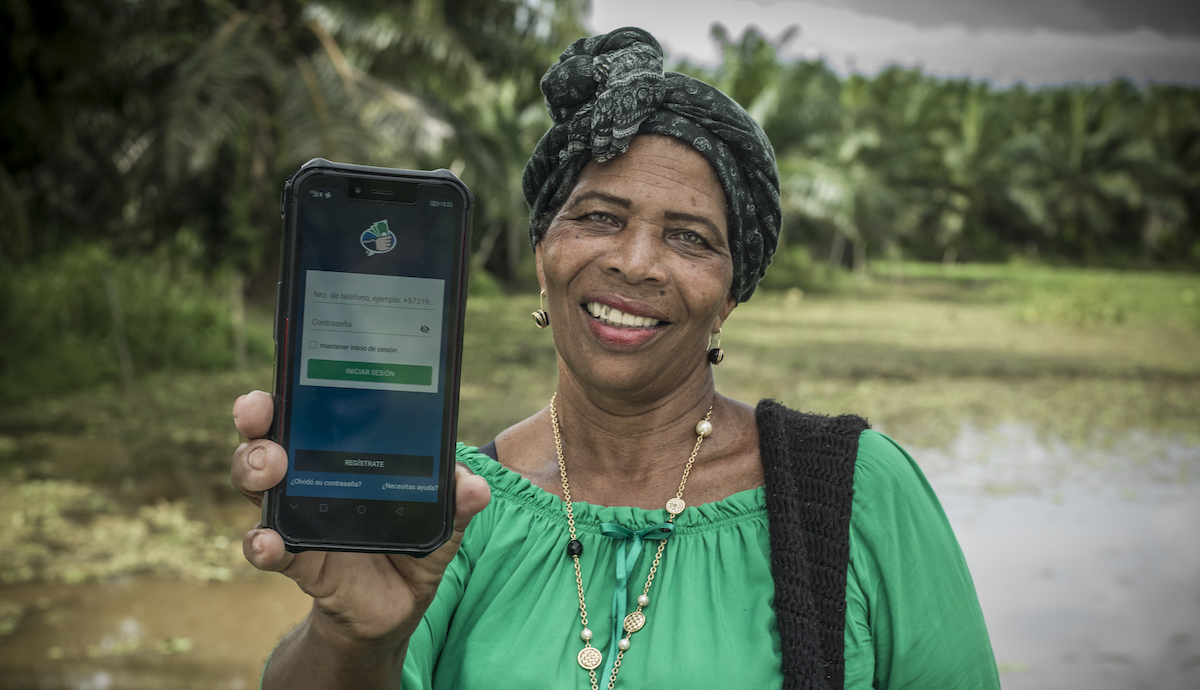Catalina, age 60, is the head of her household. She suffered the loss of her husband during the armed conflicts that once afflicted Colombia. When her children were very young, a group of militants executed her husband and she had to flee with her family and few belongings. When the conflicts subsided in Montes de María, she returned to work on the land she had inherited; 10 hectares.
Compared to other agricultural sectors, palm oil generates 20% higher wages for producers, according to Fedesarrollo, an economic and social think tank in Colombia. For Catalina, the higher wages have allowed her to improve her living conditions.
My income has been excellent. I came displaced with one hand in front and another in the back. Thanks to God and the palm, I have a better life. Now I have a brick house and I bought two other plots of land in the town where I built houses for renting, generating more income for my family.
Catalina Zuñiga
Small palm growers like Catalina receive technical assistance and business support. They engage in marketing contracts that guarantee the sale of their products. The regional palm growers guild also provides technical guidance for the design and financing of the plantations, which gives farmers access to credits and incentives.
A global source of sustainable palm oil
Colombia is the fourth producer of palm oil in the world, the first in Latin America, and it’s a safe bet for the European market in terms of sustainable practices. According to Colombia’s Institute of Hydrology, Meteorology and Environmental Studies (known as IDEAM in Spanish), only 0.25% of deforestation between 2011 and 2017 can be related to oil palm cultivation. In 2017, Colombia was the only country that signed the Agreement on Zero-Deforestation. Likewise, the rate of formalized jobs in the palm oil sector has risen to 83%.
Partners
We’re looking for partners who believe that profit is more than just financial. What can we help you achieve?
While improvements are still needed to increase the production of sustainable palm oil, the sector has made significant strides. Progress in creating profitable, legitimate and healthy work in the region has been, in large part, due to the consistent and expert support from leaders in Dutch development cooperation.
International sustainability & carbon certification
The overall share of certified palm oil increased from around 5% in 2014 to approximately 20% in 2018. Guidance from the well-known RSPO and Rainforest Alliance (RA) certifications has been in place for several years, but the first Colombian companies earned the International Sustainability & Carbon Certification (ISCC) in 2017. Although introduced later than other certifications, the share of ISCC-certified palm oil quickly grew to 8% of the national production in 2018, while RSPO and RA accounted for 13% and 3% respectively.
To increase the sustainable growth of small producers who can not yet be covered by these programmes, investment in physical and digital infrastructure, transparent environmental monitoring, inclusive formalization, and access to credit and training are crucial.

RSPO in Guatemala and Honduras
The Roundtable on Sustainable Palm Oil (RSPO) members in Guatemala and Honduras have collaborated online to raise awareness and bring the standards into context through each country’s legal framework.
Transitioning to sustainability
For Catalina, digital innovations helped her overcome a hurdle that many smallholders face — access to finance. The implementation of sustainable practices comes with a price tag, but traditional banks see smallholder farmers as too risky. Key constraints are the high-risk profile of agriculture production, lack of reliable on-crop data, high management costs for small-size loans to farmers and the lack of suitable lending products.
Solidaridad partnered with 4ToldFinTech to launch AgroPrestamo, which uses artificial intelligence for the digital administration of the credit cycle (granting, monitoring and collection); allowing real-time traceability of the associated risks. In this way, stakeholders can permanently monitor the credit risk profile of debtors, the use and allocation of resources, payment behavior and other relevant risk factors.
This has given Catalina access to real time views of her account, lines of credit, and the ability to grow her business, and support her family — because sustainability starts with the farmer.





